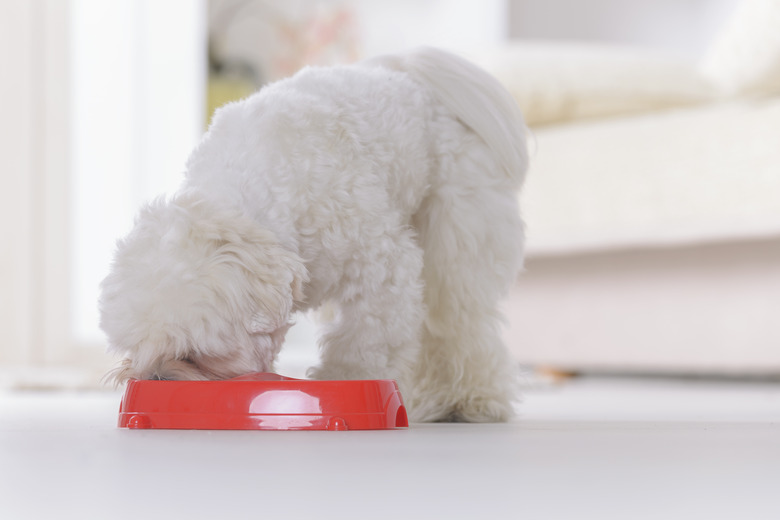Are Roaches Bad For Dogs To Eat?
If you wake up in the middle of the night with your dog chasing something across the floor, the last thing you want to say to yourself is, "My dog ate a roach!" Domestic dogs have fairly strong prey drives that inspire them to chase all sorts of things that move, including insects. If your dog catches and eats a cockroach or even decides to eat a roach that is already dead, it is possible though unlikely that he will get sick as a result.
Cockroaches in the house
Cockroaches in the house
According to the University of Kentucky, cockroaches are the most common type of insect found inside American homes. Types of roaches commonly found in the United States include German cockroaches, American cockroaches, Oriental cockroaches, and brown-banded cockroaches. They like to live in damp, warm areas and are able to survive in a wide variety of climates. Roaches will eat almost any substance, including wallpaper paste, clothing, and paper.
In areas where cockroaches thrive, it's very difficult to eliminate them because they can enter the home in so many ways. Some cockroach species gain entry through furniture; through gaps around windows, doors, and vents; through utility openings; or in firewood. They are tiny enough that they can travel through apartment walls between units, which means that if one unit has them, many units probably have them even if the units are all very sanitary.
Dog eats cockroach?
Dog eats cockroach?
Roaches are not poisonous in their natural state, and they do not contain toxic ingredients. In some cultures, many different insect varieties are eaten as a delicacy and as a normal staple food source. Your dog will not be instantly poisoned by eating a normal, healthy cockroach. Some dogs may experience an allergic reaction due to consuming a roach, but it is not common.
Clegg's Pest Control says if your dog eats a cockroach, there isn't much you can do except monitor your dog for signs of sickness. Chances are she will only eat one cockroach because cockroaches generally scurry away and hide when they encounter a human or an animal. There is the possibility that the insect can be harboring bacteria, so keep an eye out for any unusual behavior or activity once you suspect that your dog has eaten a cockroach.
Dog ate cockroach poison
Dog ate cockroach poison
While roaches are not naturally poisonous, humans spend lots of time and money purposely poisoning roaches. Roach poison is toxic, though the dosage required to kill a cockroach should be too low to seriously harm your dog if he eats a poisoned roach.
The American Society for the Prevention of Cruelty to Animals says that it is surprisingly common for cats and dogs to eat ant and cockroach baits. The ingredients that make them attractive to the insects are sugar and other good-tasting things, so this means that dogs want to eat them too. If your dog does eat the baits, the active ingredients are present in such a small amount that you likely won't see problems other than possible stomach upset. These baits are typically in a plastic package, which is probably more of a concern due to potential intestinal blockage than eating the bait itself.
Sometimes, people will mix boric acid with sugar to create a DIY cockroach bait. Roaches crawl over the dust, and it adheres to their body, which they then eat as they clean themselves. If insects eat boric acid, it disrupts their stomach and can kill them by drying them out. The National Pesticide Information Center says that boric acid is harmful to pets in large doses greater than 631 milligrams of boric acid per kilogram of body weight. So, while it's not great, it's also not terribly toxic either.
Roaches can spread disease
Roaches can spread disease
Combat says that one of the manifestations of a roach infestation can be finding roaches in dog food or in a pet's water bowl. Cockroaches can spread diseases because they carry large amounts of bacteria, including salmonella, staphylococcus, and streptococcus. If you or your pet come in contact with contaminated surfaces, you can easily get sick.
When your dog eats roaches, she is exposed to bacteria that can potentially land her in the veterinarian's office. It will be almost impossible for you to know if your dog became sick due to the roach she ate or if her illness has another cause, but the potential for illness should be sufficient reason for you to prevent your dog from eating a roach if you have the opportunity to do so.
Always check with your veterinarian before changing your pet's diet, medication, or physical activity routines. This information is not a substitute for a vet's opinion.
References
- University of Kentucky: Cockroach Elimination in Homes and Apartments
- American Society for the Prevention of Cruelty to Animals: Don't Panic! Five Items Pet Parents Shouldn't Worry About
- Clegg's Pest Control: Can Roaches Bite Dogs?
- Combat: FAQ – Are Cockroaches Harmful to Your Pets?
- National Pesticide Information Center: Boric Acid
